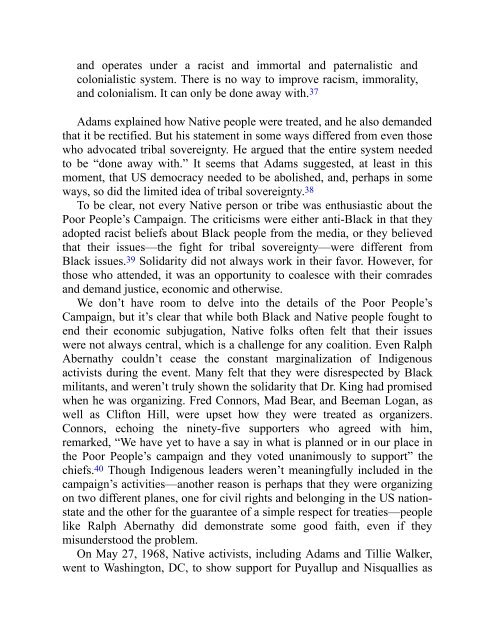Create successful ePaper yourself
Turn your PDF publications into a flip-book with our unique Google optimized e-Paper software.
and operates under a racist and immortal and paternalistic and<br />
colonialistic system. There is no way to improve racism, immorality,<br />
and colonialism. It can only be done away with. 37<br />
Adams explained how Native people were treated, and he also demanded<br />
that it be rectified. But his statement in some ways differed from even those<br />
who advocated tribal sovereignty. He argued that <strong>the</strong> entire system needed<br />
to be “done away with.” It seems that Adams suggested, at least in this<br />
moment, that US democracy needed to be abolished, and, perhaps in some<br />
ways, so did <strong>the</strong> limited idea <strong>of</strong> tribal sovereignty. 38<br />
To be clear, not every Native person or tribe was enthusiastic about <strong>the</strong><br />
Poor People’s Campaign. The criticisms were ei<strong>the</strong>r anti-Black in that <strong>the</strong>y<br />
adopted racist beliefs about Black people from <strong>the</strong> media, or <strong>the</strong>y believed<br />
that <strong>the</strong>ir issues—<strong>the</strong> fight for tribal sovereignty—were different from<br />
Black issues. 39 Solidarity did not always work in <strong>the</strong>ir favor. However, for<br />
those who attended, it was an opportunity to coalesce with <strong>the</strong>ir comrades<br />
and demand justice, economic and o<strong>the</strong>rwise.<br />
We don’t have room to delve into <strong>the</strong> details <strong>of</strong> <strong>the</strong> Poor People’s<br />
Campaign, but it’s clear that while both Black and Native people fought to<br />
end <strong>the</strong>ir economic subjugation, Native folks <strong>of</strong>ten felt that <strong>the</strong>ir issues<br />
were not always central, which is a challenge for any coalition. Even Ralph<br />
Abernathy couldn’t cease <strong>the</strong> constant marginalization <strong>of</strong> <strong>Indigenous</strong><br />
activists during <strong>the</strong> event. Many felt that <strong>the</strong>y were disrespected by Black<br />
militants, and weren’t truly shown <strong>the</strong> solidarity that Dr. King had promised<br />
when he was organizing. Fred Connors, Mad Bear, and Beeman Logan, as<br />
well as Clifton Hill, were upset how <strong>the</strong>y were treated as organizers.<br />
Connors, echoing <strong>the</strong> ninety-five supporters who agreed with him,<br />
remarked, “We have yet to have a say in what is planned or in our place in<br />
<strong>the</strong> Poor People’s campaign and <strong>the</strong>y voted unanimously to support” <strong>the</strong><br />
chiefs. 40 Though <strong>Indigenous</strong> leaders weren’t meaningfully included in <strong>the</strong><br />
campaign’s activities—ano<strong>the</strong>r reason is perhaps that <strong>the</strong>y were organizing<br />
on two different planes, one for civil rights and belonging in <strong>the</strong> US nationstate<br />
and <strong>the</strong> o<strong>the</strong>r for <strong>the</strong> guarantee <strong>of</strong> a simple respect for treaties—people<br />
like Ralph Abernathy did demonstrate some good faith, even if <strong>the</strong>y<br />
misunderstood <strong>the</strong> problem.<br />
On May 27, 1968, Native activists, including Adams and Tillie Walker,<br />
went to Washington, DC, to show support for Puyallup and Nisquallies as


















